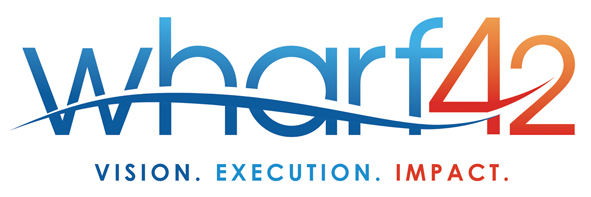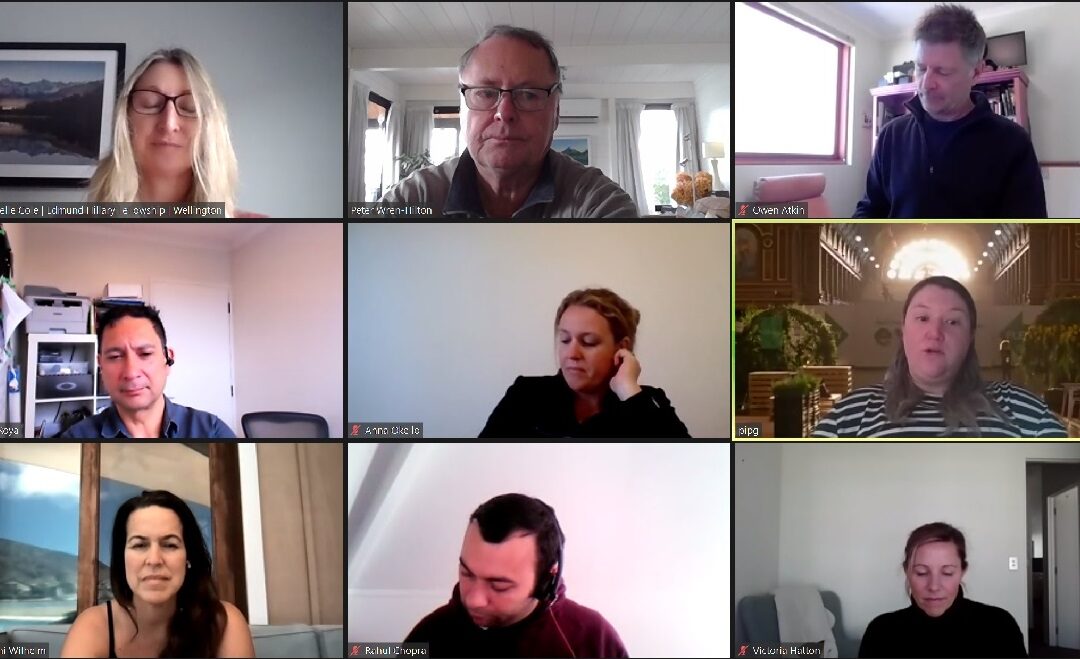
by Peter Wren-Hilton | Aug 16, 2021 | 2035 Oceania Summit
I was delighted to host the first meeting of the 2035 Oceania Summit Advisory Committee this morning. Despite New Zealand going into COVID-19 lockdown Level 4 overnight, it was an honour to be joined by such a committed group of globally-recognised AgriFoodTech and Climate Change experts. You can learn more about the team at www.2035.ag
The main purpose of the meeting was to discuss the developing Summit programme. The Advisory Committee represent a diverse range of stakeholders and that was reflected in this morning’s meeting. I believe the lessons and conversations that emerge from the Summit will have a lasting impact on how the world looks at agrifood technology and its ability to help address climate change.
Over the past few months, we have been working with both Auckland Unlimited and the Business Events team at Tourism New Zealand to deliver a fantastic experience for delegates. Over the coming weeks, I expect to be able to announce several additional partnerships which will help take the event to the next level.
The Advisory Committee will be meeting again next month as the Summit programme builds. If you want to keep up to speed with developments, please sign up to the Summit newsletter. You can find that on the Summit landing page here.
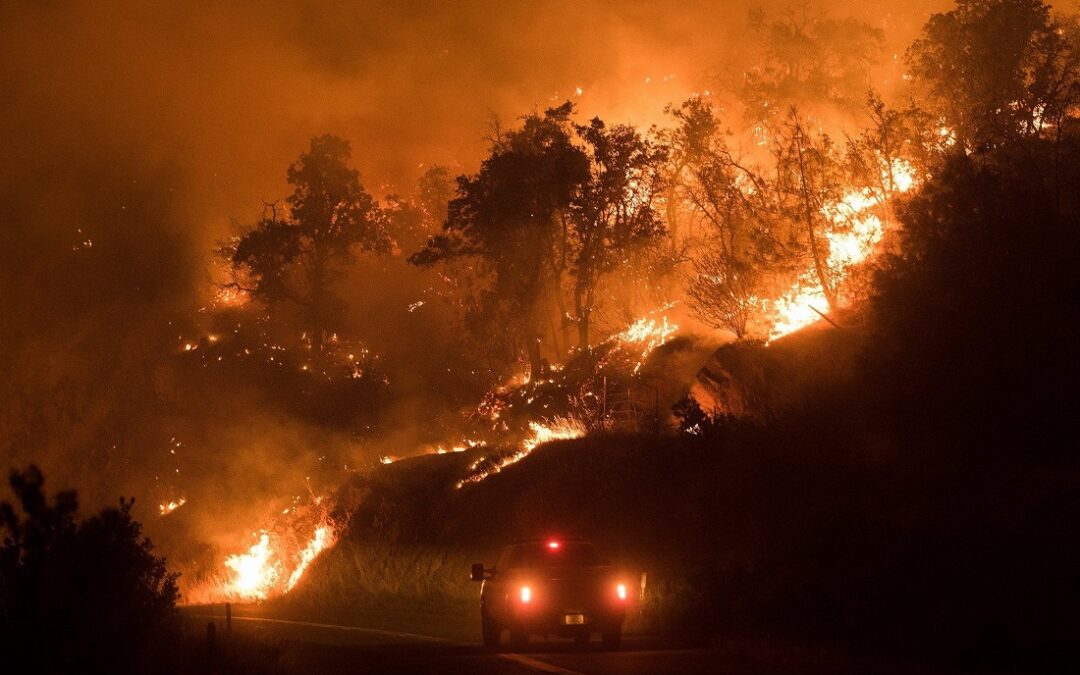
by Peter Wren-Hilton | Aug 9, 2021 | 2035 Oceania Summit
Today’s UN IPCC Climate Change report sets out a stark message on the state of the climate crisis. If we do not accelerate our efforts to reduce global greenhouse gas emissions in the near term, the consequences for future generations look dire. The sober assessment of our planet’s future has been delivered by the UN’s Intergovernmental Panel on Climate Change (IPCC), a group of scientists whose findings are endorsed by the world’s governments.
When Jacqui and I decided last year to focus all our efforts on promoting agrifood technology’s ability to help farmers and growers reduce their greenhouse gas emissions as well as design new and more sustainable growing systems, we did so against the growing, indisputable evidence of climate change. Increased extreme weather events continue to impact geographic regions and peoples across the world. Without urgent action, they are simply a foretaste of what is to come.
Next April, we will be hosting the 2035 Oceania Summit in Auckland. The Summit has been designed to enable the region’s scientific & research community, its industry leaders, agribusiness & agritech companies, farmers & growers, regulators and policy makers to meet and discuss how agrifood tech innovation and on-farm application can help address the existential threat posed by climate change.
Over the coming days, we will be announcing a number of Summit partnerships and associated initiatives that we will be running in preparation for the Summit.
To register your interest in the 2035 Oceania Summit, please visit the landing page here.
To learn more about today’s sobering UN Climate Change Report, please download a copy here.
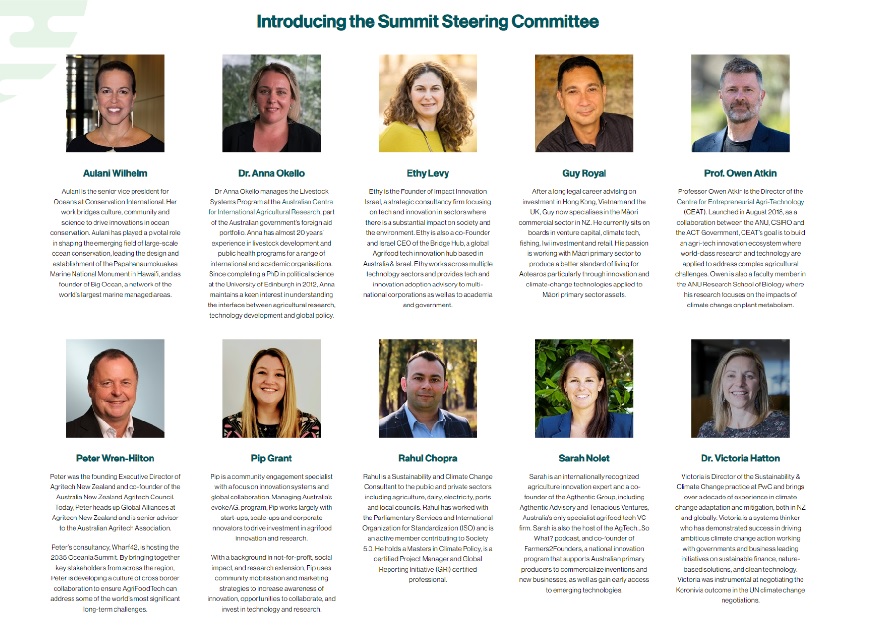
by Peter Wren-Hilton | Jul 26, 2021 | 2035 Oceania Summit
I am delighted to be able to formally introduce the members of the 2035 Oceania Summit Steering Committee.
The members represent key stakeholder groups engaged in both agrifood tech and climate change. This includes industry, research, government and investment. No single entity can address the existential threat posed by a changing climate on the world’s ability to produce nutritious and affordable food for its rapidly growing population. It requires a coordinated and collaborative response.
Introducing the Summit Steering Committee members:
Professor Owen Atkin: Owen is the Director of the Centre for Entrepreneurial Agri-Technology (CEAT). Launched in August 2018, as a collaboration between the Australia National University, CSIRO and the ACT Government, CEAT’s goal is to build an agri-tech innovation ecosystem where world-class research and technology are applied to address complex agricultural challenges. Owen is also a faculty member in the ANU Research School of Biology where his research focuses on the impacts of climate change on plant metabolism.
Rahul Chopra: Rahul is a Sustainability and Climate Change Consultant to the public and private sectors including agriculture, dairy, electricity, ports and local councils. Rahul has worked with the New Zealand Parliamentary Services and International Organization for Standardization (ISO) and is an active member contributing to Society 5.0. He holds a Masters in Climate Policy, is a certified Project Manager and Global Reporting Initiative (GRI) certified professional.
Dr Victoria Hatton: Victoria is Director of the Sustainability & Climate Change practice at PwC and brings over a decade of experience in climate change adaptation and mitigation, both in NZ and globally. Victoria is a systems thinker who has demonstrated success in driving ambitious climate change action working with governments and business leading initiatives on sustainable finance, nature-based solutions, and clean technology. Victoria was instrumental at negotiating the Koronivia outcome in the UN climate change negotiations.
Sarah Nolet: Sarah is an internationally recognized agriculture innovation expert and a co-founder of the Agthentic Group, including Agthentic Advisory and Tenacious Ventures, Australia’s only specialist agrifood tech VC firm. Sarah is also the host of the AgTech…So What? podcast, and co-founder of Farmers2Founders, a national innovation program that supports Australian primary producers to commercialize inventions and new businesses, as well as gain early access to emerging technologies.
Pip Grant: Pip is a community engagement specialist with a focus on innovation systems and global collaboration. Managing Australia’s evokeAG. program, Pip works largely with start-ups, scale-ups and corporate innovators to drive investment in agrifood innovation and research. With a background in not-for-profit, social impact, and research extension, Pip uses community mobilisation and marketing strategies to increase awareness of innovation, opportunities to collaborate, and invest in technology and research.
Ethy Levy: Ethy is the Founder of Impact Innovation Israel, a strategic consultancy firm focusing on tech and innovation in sectors where there is a substantial impact on society and the environment. Ethy is also a co-Founder and Israel CEO of the Bridge Hub, a global Agrifood tech innovation hub based in Australia & Israel. Ethy works across multiple technology sectors and provides tech and innovation adoption advisory to multi-national corporations as well as to academia and government.
Guy Royal: After a long legal career advising on investment in Hong Kong, Vietnam and the UK, Guy now specialises in the Māori commercial sector in NZ. He currently sits on boards in venture capital, climate tech, fishing, Iwi investment and retail. His passion is working with Māori primary sector to produce a better standard of living for Aotearoa particularly through innovation and climate-change technologies applied to Māori primary sector assets.
Dr Anna Okello; Anna manages the Livestock Systems Program at the Australia Centre for International Agricultural Research, part of the Australian government’s foreign aid portfolio. Anna has almost 20 years’ experience in livestock development and public health programs for a range of international and academic organisations. Since completing a PhD in political science at the University of Edinburgh in 2012, Anna maintains a keen interest in understanding the interface between agricultural research, technology development and global policy.
Aulani Wilhelm: Aulani is the senior vice president for Oceans at Conservation International. Her work bridges culture, community and science to drive innovations in ocean conservation. Aulani has played a pivotal role in shaping the emerging field of large-scale ocean conservation, leading the design and establishment of the Papahanaumokuakea Marine National Monument in Hawaiʻi, and as founder of Big Ocean, a network of the world’s largest marine managed areas.
Finally, I make up the tenth member of the Summit’s Steering Committee.
The Summit is fortunate to have such an experienced and diverse group of individuals working together. We intend to deliver a programme that will make a real difference and build on the opportunity of showcasing local solutions that will have global impact.
For more details and to register your interest in the 2035 Oceania Summit, please go to www.2035.ag
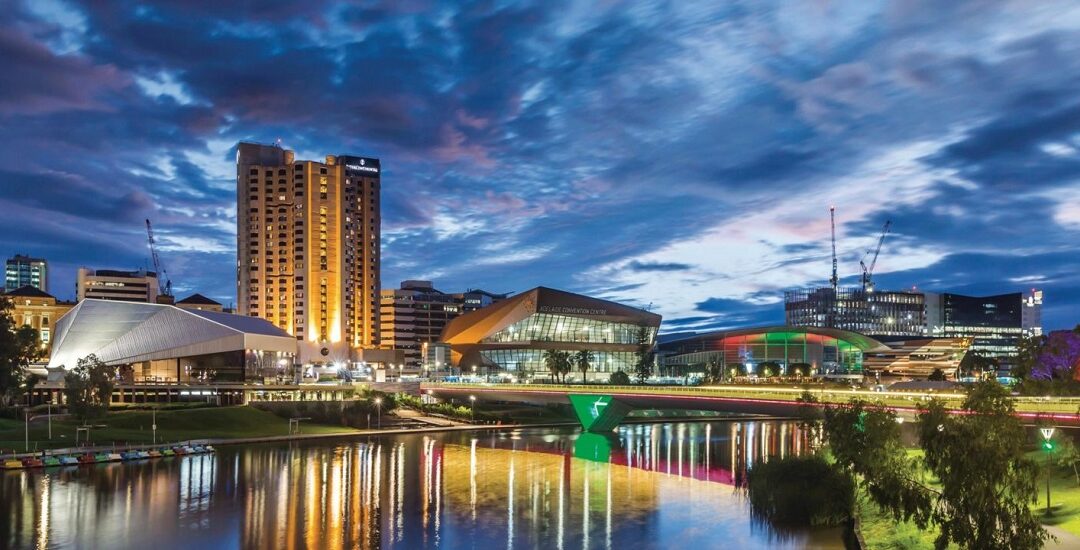
by Peter Wren-Hilton | Jul 20, 2021 | Events
Overnight, the South Australian government introduced increased community restrictions because of 2 new COVID-19 cases in the State. At about 7.00pm (NZT), I received a call from the Department of Primary Industries and Regions (PIRSA) advising me that Friday’s AdvanceAg conference had been postponed.
From a personal perspective, I have to admit – the news sucked.
I’ve been looking forward to catching up with South Australia’s agritech community for some time. Back in October 2020, the South Australian AgTech Advisory Group published the South Australian AgTech Strategic Plan, on behalf of the South Australian government. We were due to meet for breakfast on Thursday. On Wednesday evening, I had been invited to speak at an Adelaide AgTech Meetup meeting, whilst on Thursday, Elders, Australia’s largest rural services group, had invited a number of guests to a 2-hour presentation and Q&A session at their Adelaide HQ.
Like Friday’s AdvanceAg conference, all postponed until a later date.
My immediate thoughts are with those effected by both the pandemic and the impact of border closures, lockdowns and community restrictions. Last night’s call however also reinforced in my mind the importance and need to strengthen the framework for increased trans-Tasman collaboration in the AgriFoodTech space. The major global challenges that I had planned to focus on at Friday’s conference; food security, climate and the planning for a future agricultural workforce, have not gone away. These challenges will continue to grow and the time to tackle them is now, not at some unknown ‘later date’.
Despite last night’s news, I am already looking ahead to my next trip across the ditch. As an unpaid banker to Qantas and Air New Zealand, I now have enough airpoint credits to get me from Tauranga to Perth and back. Twice. So no excuse. Strengthening the trans-Tasman framework is a key priority and I look forward to working with partners and friends on both sides of the Tasman to make it happen.
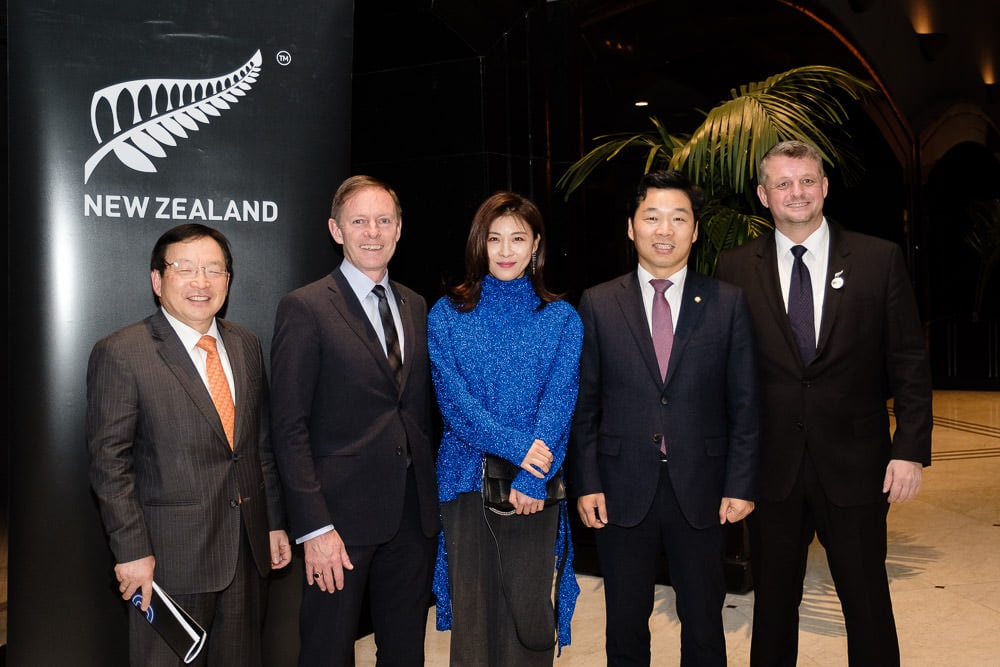
by Peter Wren-Hilton | Jul 14, 2021 | Events
On 25-26 August, the New Zealand Chamber of Commerce in Korea will be hosting a two-day (virtual) tech roadshow. Its purpose is to provide New Zealand technology companies with the opportunity to present to, and connect with, some of Korea’s leading partners, investors, industry players and businesses.
Why Korea?
- The world’s 9th largest economy
- The world’s leading digital infrastructure
- Innovation and high skilled workforce
- Ideal global test bed
- Business hub of North East Asia
- Booming e-commerce market
- Business friendly frameworks
The New Zealand Chamber of Commerce in Korea (‘The Kiwi Chamber’) are seeking expressions of interest from New Zealand technology companies in the agritech, AI, cleantech and fintech spaces. New Zealand companies working in these areas are highly valued in Korea and the opportunity to develop collaborative partnerships is real.
If you want to learn more, please contact Gina Park of the Kiwi Chamber at kiwitechseoul@gmail.com
Alternatively, please complete the Expression of Interest Form here.
I look forward to joining the team (remotely) on the 25th. I hope you can to!

